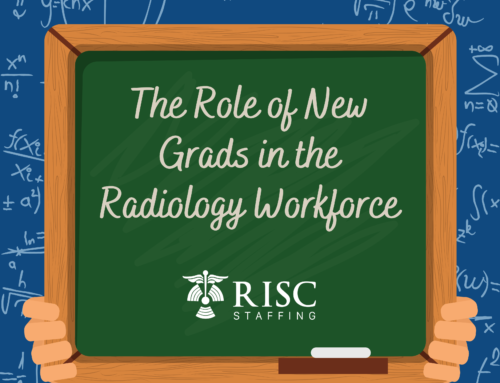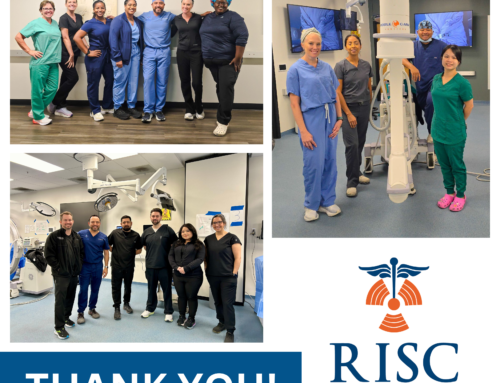Ensuring Safety & Compliance:
Radiation Safety In Radiology Staffing
Radiology plays a crucial role in modern healthcare, offering invaluable insights into patients’ conditions through the use of imaging technology. However, with this technological advancement comes the responsibility to ensure the safety and well-being of both patients and staff. Radiation safety is a paramount concern in radiology departments, and healthcare facilities must prioritize compliance with regulatory standards to mitigate risks and protect personnel. In this blog, we’ll explore the importance of radiation safety in radiology staffing and discuss best practices for ensuring compliance.
Understanding Radiation Safety: Radiation is a powerful tool in medical imaging because it can pose inherent risks to those exposed to it. Radiology technologists, who work closely with imaging equipment on a daily basis, are particularly vulnerable to radiation exposure. Prolonged or excessive exposure can lead to serious health issues, including radiation burns, cataracts, and an increased risk of cancer. Therefore, it’s essential for radiology staff to be well-trained in radiation safety protocols and for healthcare facilities to implement robust safety measures to minimize exposure risks.
To ensure the safety of both patients and staff, regulatory agencies such as the U.S. Nuclear Regulatory Commission (NRC) and the Occupational Safety and Health Administration (OSHA) have established strict guidelines and regulations governing radiation safety in healthcare settings. These guidelines outline requirements for radiation monitoring, protective equipment, training, and record-keeping. Healthcare facilities must adhere to these regulations to maintain compliance and protect their staff from unnecessary radiation exposure.
Best Practices for Radiation Safety in Radiology Staffing:
- Training and Education: Comprehensive training on radiation safety protocols is essential for all radiology staff. Technologists should receive thorough instruction on proper handling of imaging equipment, use of protective shielding, and adherence to ALARA (As Low As Reasonably Achievable) principles to minimize radiation exposure.
- Personal Protective Equipment (PPE): Adequate PPE, such as lead aprons, thyroid shields, and lead glasses, should be provided to radiology staff to protect them from radiation exposure. Regular inspection and maintenance of PPE are necessary to ensure effectiveness.
- Radiation Monitoring: Routine monitoring of radiation exposure levels is crucial for identifying potential risks and implementing corrective measures. Dosimeters should be worn by radiology staff and regularly analyzed to assess cumulative radiation exposure.
- Equipment Maintenance: Regular maintenance and calibration of imaging equipment are essential to ensure accurate radiation doses and minimize the risk of equipment malfunction. Facilities should establish protocols for equipment inspection, maintenance, and repair to uphold safety standards.
- Adherence to Protocols: Strict adherence to established radiation safety protocols is paramount in minimizing exposure risks. This includes proper positioning of patients, optimizing imaging techniques to reduce radiation doses, and following established ALARA principles.
- Continuous Quality Improvement: Healthcare facilities should implement quality assurance programs to monitor radiation safety practices and identify areas for improvement. Regular audits, peer reviews, and feedback mechanisms can help ensure ongoing compliance and adherence to best practices.
RISC Staffing’s Commitment to Radiation Safety:
At RISC Staffing, we prioritize the safety and well-being of our radiology staff and the patients they serve. We emphasize and ensure that technologists are equipped with the knowledge and skills to uphold radiation safety standards effectively. By prioritizing compliance with regulatory standards and promoting a culture of safety, we strive to mitigate risks and create a safer working environment for radiology staff across the Texas Region and beyond.
Radiation safety is a critical aspect of radiology staffing, requiring diligence, expertise, and a commitment to compliance. By implementing robust safety measures, providing comprehensive training, and adhering to regulatory standards, healthcare facilities can minimize radiation exposure risks and protect the well-being of their staff. At RISC Staffing, we stand ready to support our clients in maintaining compliance with radiation safety regulations and fostering a culture of safety in radiology departments. Together, we can ensure that radiology staff work in environments that prioritize their safety and enable them to deliver high-quality care to patients.
Please visit the U.S.NRC for more information on ALARA.







[…] Radiology plays a crucial role in modern healthcare, offering invaluable insights into patients’ conditions through the use of imaging technology. However, with this technological advancement comes the responsibility to ensure the safety and well-being of both patients and staff. […]